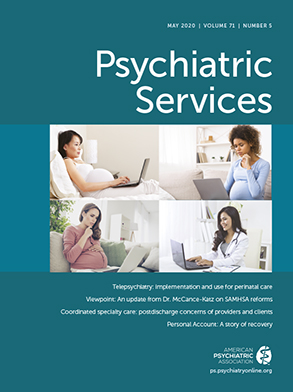IN REPLY: Manigsaca and colleagues (
1) make a case for psychiatric advance directives (PADs) to be used alongside other evidence-based treatments for borderline personality disorder to improve treatment outcomes. An increasing number of countries and states in the United States are beginning to make explicit legal provisions for PADs (
2) as a way for service users to make their treatment preferences known if they are not competent to make treatment decisions in a mental health crisis.
Crisis planning is an important element of both specialist and generalist evidence-based treatments for borderline personality disorder. Crisis plans are developed by the primary treater in collaboration with the patient and others involved in a support system to provide a predictable set of procedures and options that could help in a crisis. Crisis planning can prevent harmful treatment interventions in the care of borderline personality disorder, such as unnecessary hospitalizations, derailed treatments, and reactive prescribing (resulting in psychiatric polypharmacy). It also helps guide further treatment and disposition planning in the emergency room or inpatient setting. In other words, crisis planning is a low-resource way to ensure that service users are receiving emergency care in line with evidence-based guidelines for the treatment of borderline personality disorder.
Manigsaca and colleagues highlight the effectiveness of PADs for use with schizophrenia and bipolar disorder, in which acute psychotic or manic episodes threaten competence. Like schizophrenia and bipolar disorder, borderline personality disorder is a serious mental illness associated with high health care costs and levels of disability (
3). But unlike psychosis and mania, acute symptoms in borderline personality disorder are more transient. For example, affective shifts in borderline personality disorder are more frequent, short-lived, and interpersonally mediated than those of bipolar disorder (
4). This symptom profile sets borderline personality disorder apart from other serious mental illnesses, with symptoms that impair competence more transiently rather than chronically.
This difference is important in making treatment recommendations for borderline personality disorder. Management of bipolar disorder and schizophrenia relies on medications to stabilize acute symptoms of mania or psychosis. However, the U.S. Food and Drug Administration has approved no medications for borderline personality disorder. Its evidence-based treatments are psychotherapies that depend more heavily on the activity of the patient to make changes in ways of thinking, managing emotions, and behaving. While we agree with Manigsaca and colleagues that crisis planning is important in the treatment of borderline personality disorder, we argue that it should ideally happen in conjunction with an approach that emphasizes and builds the competence of the patient.

